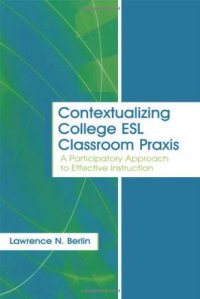
Ebook: Contextualizing College ESL Classroom Praxis: A Participatory Approach to Effective Instruction
Author: Lawrence N. Berlin
- Series: Language Culture and Teaching Series
- Year: 2005
- Publisher: Routledge
- Language: English
- pdf
Contextualizing College ESL Classroom Praxis: A Participatory Approach to Effective Instruction provides pre-service and in-service teachers with a model for engaging in effective instruction with the variety of students encountered in college English as a second language or foreign language classrooms. Along with the model, the text is designed to help readers develop the tools to use it within a participatory approach. This approach, based on the principles of Paulo Freire's critical pedagogy, is combined with multicultural education and the general tenets of a communicative approach to language teaching. From the philosophical to the theoretical to the practical, these strands are combined into a cohesive whole.
The underlying premise is that the best way to develop an understanding of a participatory approach is to engage in it. Throughout the book, readers are asked to apply problem-posing--a learning process that begins with naming issues, reflecting on them and possible solutions, and acting upon one's ideas. Questions addressed include:
*What is the nature of process over product?
*Is a new definition of effective instruction necessary?
*What are the factors that can affect second language acquisition?
*What do teachers believe about effective language instruction?
*What do students believe about effective language instruction?
*What makes pedagogy effective?
*How do teachers and students relate in the classroom?
*What does instruction mean for students?
*How can effective praxis be adapted to various contexts?
Each chapter includes Pre-Reading Questions, Post-Reading Questions, a topic for a Reflective Journal, and Follow-Up Activities. These provide opportunities to enhance comprehension of the material, to co-construct new knowledge with classmates, and to review personal beliefs and ideas in an effort to modify or reinforce them in one's own developing model for effective language instruction.
The underlying premise is that the best way to develop an understanding of a participatory approach is to engage in it. Throughout the book, readers are asked to apply problem-posing--a learning process that begins with naming issues, reflecting on them and possible solutions, and acting upon one's ideas. Questions addressed include:
*What is the nature of process over product?
*Is a new definition of effective instruction necessary?
*What are the factors that can affect second language acquisition?
*What do teachers believe about effective language instruction?
*What do students believe about effective language instruction?
*What makes pedagogy effective?
*How do teachers and students relate in the classroom?
*What does instruction mean for students?
*How can effective praxis be adapted to various contexts?
Each chapter includes Pre-Reading Questions, Post-Reading Questions, a topic for a Reflective Journal, and Follow-Up Activities. These provide opportunities to enhance comprehension of the material, to co-construct new knowledge with classmates, and to review personal beliefs and ideas in an effort to modify or reinforce them in one's own developing model for effective language instruction.
Download the book Contextualizing College ESL Classroom Praxis: A Participatory Approach to Effective Instruction for free or read online
Continue reading on any device:

Last viewed books
Related books
{related-news}
Comments (0)